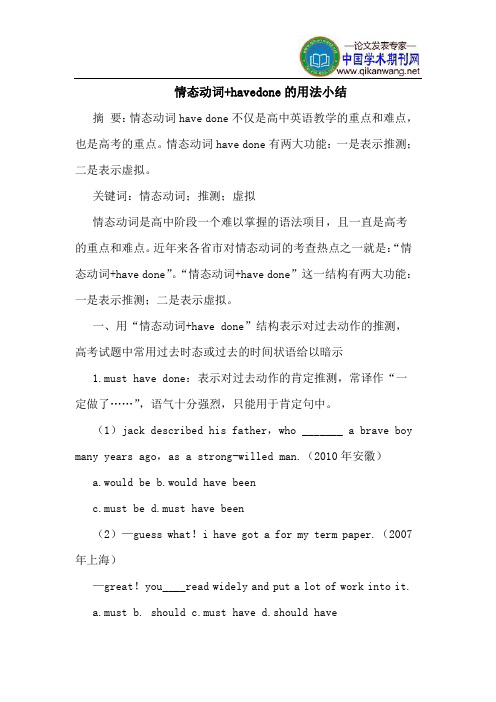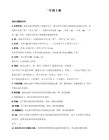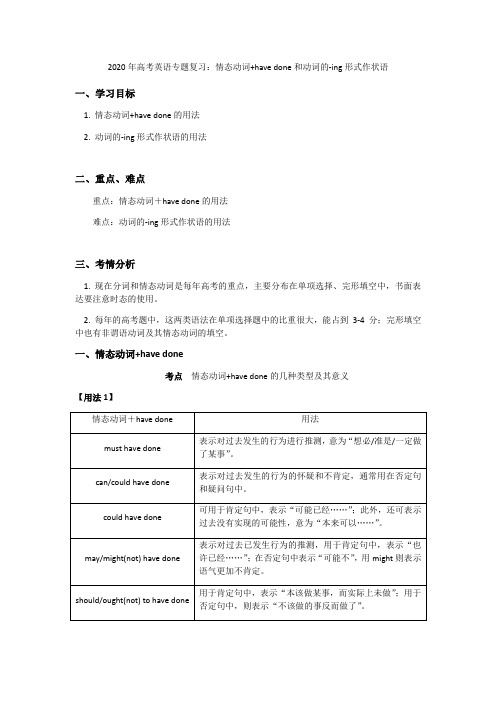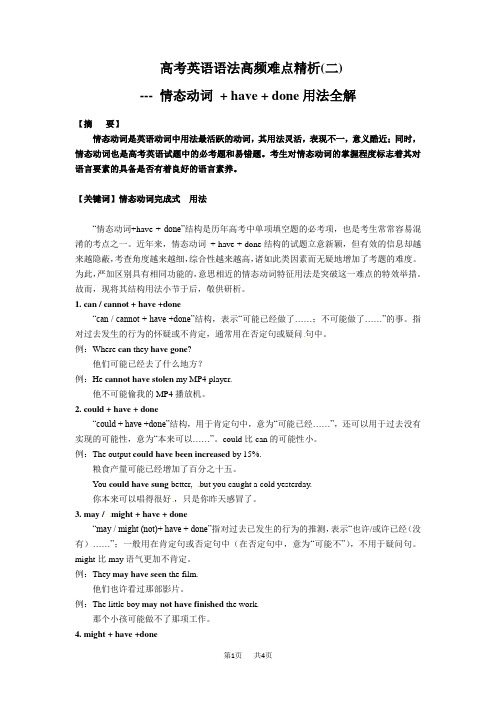2020年高考英语一轮复习 情态动词have done复习
情态动词+havedone的用法小结

情态动词+havedone的用法小结摘要:情态动词have done不仅是高中英语教学的重点和难点,也是高考的重点。
情态动词have done有两大功能:一是表示推测;二是表示虚拟。
关键词:情态动词;推测;虚拟情态动词是高中阶段一个难以掌握的语法项目,且一直是高考的重点和难点。
近年来各省市对情态动词的考查热点之一就是:“情态动词+have done”。
“情态动词+have done”这一结构有两大功能:一是表示推测;二是表示虚拟。
一、用“情态动词+have done”结构表示对过去动作的推测,高考试题中常用过去时态或过去的时间状语给以暗示1.must have done:表示对过去动作的肯定推测,常译作“一定做了……”,语气十分强烈,只能用于肯定句中。
(1)jack described his father,who _______ a brave boy many years ago,as a strong-willed man.(2010年安徽)a.would beb.would have beenc.must bed.must have been(2)—guess what!i have got a for my term paper.(2007年上海)—great!you____read widely and put a lot of work into it.a.mustb. shouldc.must haved.should havekeys:d;c(注意:must have done只能表推测)2.may/might have done表示对过去的可能性推测“过去可能做了某事”,其程度小于must have done,一般也用于肯定句。
如:—i left my handbag on the train,but luckily someone gave it to the railway officials.—how unbelievable to get it back!i mean,someone _______ it.(2011年江苏)a.will have stolenb.might have stolenc.should have stolend.must have stolenkeys:b3.can/could (not)have done意思是“过去(不)可能做过某事”,常用于否定句和疑问句。
超实用新高考英语专题复习:+have done的用法

“情态动词+have done”的用法距离高考还有一段时间,不少有经验的老师都会提醒考生,愈是临近高考,能否咬紧牙关、学会自我调节,态度是否主动积极,安排是否科学合理,能不能保持良好的心态、以饱满的情绪迎接挑战,其效果往往大不一样。
以下是本人从事10多年教学经验总结出的以下学习资料,希望可以帮助大家提高答题的正确率,希望对你有所帮助,有志者事竟成!养成良好的答题习惯,是决定高考英语成败的决定性因素之一。
做题前,要认真阅读题目要求、题干和选项,并对答案内容作出合理预测;答题时,切忌跟着感觉走,最好按照题目序号来做,不会的或存在疑问的,要做好标记,要善于发现,找到题目的题眼所在,规范答题,书写工整;答题完毕时,要认真检查,查漏补缺,纠正错误。
总之,在最后的复习阶段,学生们不要加大练习量。
在这个时候,学生要尽快找到适合自己的答题方式,最重要的是以平常心去面对考试。
英语最后的复习要树立信心,考试的时候遇到难题要想“别人也难”,遇到容易的则要想“细心审题”。
越到最后,考生越要回归基础,单词最好再梳理一遍,这样有利于提高阅读理解的效率。
另附靠前30天复习方法。
☞重/难点重点:“情态动词+have done”的各种形式及其表达的意义。
难点:在语境中正确使用“情态动词+have done”。
☤重/难点分析重点分析:must have done用在肯定句中表示“一定做了某事”,might have done用在肯定句中表示“可能做了某事”,should have done表示“本来应该做某事(但实际上未做)”,shouldn’t have done表示“本来不应该做某事”,在疑问句或否定句中用can’t/couldn’t have done表示“不可能做了某事”,could have done表示“本可以做某事(但未做)”,needn’t have done表示“本来没必要做某事”。
学习“情态动词+have done”这一语法结构,有助于我们正确表达自己的情感和观点,是学习的重点。
高考“情态动词+have_done”考点解析

2、根据句意“我妹妹昨天在大剧院见过他”,所以,一定是对过去已经发生的否定的判断,答案选A。
3、本句表达的是对过去发生过的情况的疑问,所以应该用could have done,答案选C。
It must have rained last night, for the ground is wet this morning.
昨天晚上一定是下雨了,因为今晨地面是潮湿的。
She didn’t attend the lesson yesterday. She must have been ill.
A. should B. must C. could D. would
4. I didn’t see her in the meeting-room this morning. She ____ at the meeting. (1995 上海)
A. mustn’t have spoken B. shouldn’t have spoken
A. might B. should C. can D. will
2. The window was broken. Tom ____ have done that, for he was a little naughty.
A. could B. might C. should D. ought to
--- It ___ a comfortable journey. (MET95)
A. can’t be B. shouldn’t be C. mustn’t have been D. couldn’t have been
2. My sister met him at the Grand Theatre yesterday, so he ____ your lecture. (2002 上海)
“情态动词+have done”表推测一览表复习过程

“情态动词+h a v e d o n e”表推测一览表“情态动词+have done”表推测一览表“情态动词+be doing”表推测一览表口诀:“情动”加上have done,推测事情已经干;“情动”加上be doing,推测事情在进行;情态动词+have done表推测一、must have done一定已经做了。
They must have finished their work.他们一定做了他们的工作。
二、1、Can have done.可能已经做了。
2、Can’t have done.不可能已经做了。
They can have finished /homework so quickly.他们可能很快完成他们的工作。
They can’n have finished /homework so quickly.他们不可能很快完成他们的工作。
They can have gone to bed /since /the door is closed.门关着,他们可能已经睡着了。
完成时态+since三、1、Could have done.可能已经做过。
(对过去事情的推测)2、Couldn’t have done. 不可能已经做过。
You could have used my computer because I didn’t use it.你可能使用过我的游戏机。
因为我不能使用它。
you couldn’t have used my computer.你不可能使用过我的游戏机。
3、Could have done表过去虚拟语气,过去表本来会做而未做。
含责备,遗憾的语气。
It was so fine yesterday, you could have come out for a walk.(对过去的虚拟语气)昨天天气好,你本来可以出来散散步的。
(事实上没有散步,对过去本来会做而没有做。
)4、would have done.表示虚拟语气,本来完全可以做,而没有做。
2020年高考英语专题复习:情态动词+have done和动词的-ing形式作状语

2020年高考英语专题复习:情态动词+have done和动词的-ing形式作状语一、学习目标1. 情态动词+have done的用法2.动词的-ing形式作状语的用法二、重点、难点重点:情态动词+have done的用法难点:动词的-ing形式作状语的用法三、考情分析1. 现在分词和情态动词是每年高考的重点,主要分布在单项选择、完形填空中,书面表达要注意时态的使用。
2. 每年的高考题中,这两类语法在单项选择题中的比重很大,能占到3-4分;完形填空中也有非谓语动词及其情态动词的填空。
一、情态动词+have done考点情态动词+have done的几种类型及其意义【用法1】【例句】It must have rained last night , for the ground is still wet.昨晚肯定下雨了,地面还是湿的。
They should have received the package. We had it delivered yesterday morning.我们昨天早上发出的包裹。
他们应该已经收到了。
I can’t find my purse now. I might have left it in the taxi.我的钱包找不到了,我可能把它忘在出租车里了。
You couldn’t have known about him ten years ago, when he was still unknown.十年前你不可能认识他,那时他还不出名。
Oh,Mom!You needn’t have prepared so much food. Dad and Diana will not come back for supper.妈妈!你不必做这么多饭。
爸爸和戴安娜不回家吃晚饭了。
【考题链接】1. I didn’t see her in the meeting room this morning. She ____________ have spoken at the meeting.A. mustn’tB. shouldn’tC. needn’tD. couldn’t答案:D思路分析:句意:“我今天早上在会议室没有看到她。
高考英语语法高频难点精析-情态动词完成式

高考英语语法高频难点精析(二)--- 情态动词+ have + done用法全解【摘要】情态动词是英语动词中用法最活跃的动词,其用法灵活,表现不一,意义酷近;同时,情态动词也是高考英语试题中的必考题和易错题。
考生对情态动词的掌握程度标志着其对语言要素的具备是否有着良好的语言素养。
【关键词】情态动词完成式用法“情态动词+have + done”结构是历年高考中单项填空题的必考项,也是考生常常容易混淆的考点之一。
近年来,情态动词+ have + done结构的试题立意新颖,但有效的信息却越来越隐蔽,考查角度越来越细,综合性越来越高,诸如此类因素而无疑地增加了考题的难度。
为此,严加区别具有相同功能的,意思相近的情态动词特征用法是突破这一难点的特效举措。
故而,现将其结构用法小节于后,敬供研析。
1. can / cannot + have +done“can / cannot + have +done”结构,表示“可能已经做了……;不可能做了……”的事。
指对过去发生的行为的怀疑或不肯定,通常用在否定句或疑问句中。
例:Where can they have gone?他们可能已经去了什么地方?例:He cannot have stolen my MP4 player.他不可能偷我的MP4播放机。
2. could + have + done“could + have +done”结构,用于肯定句中,意为“可能已经……”,还可以用于过去没有实现的可能性,意为“本来可以……”。
could比can的可能性小。
例:The output could have been increased by 15%.粮食产量可能已经增加了百分之十五。
You could have sung better, but you caught a cold yesterday.你本来可以唱得很好,只是你昨天感冒了。
3. may / might + have + done“may / might (not)+ have + done”指对过去已发生的行为的推测,表示“也许/或许已经(没有)……”;一般用在肯定句或否定句中(在否定句中,意为“可能不”),不用于疑问句。
2025高考英语一轮总复习情态动词和虚拟语气考点四“情态动词+havedone”的2类用法(含答案)
高考英语一轮总复习考点突破:
考点四“情态动词+have done”的2类用法
一、对过去发生的事情或状态进行推测
我们本来可以一起面对困难,但是你为什么不告诉我?
Mark needn't have hurried.Driving at top speed, he arrived half an hour early.
马克本不必着急。
他开得飞快,早到了半小时。
即时演练(四)
单句语法填空
1.Your cousin must have enjoyed his trip in Jixian County, didn't he? He looks amazingly different.
2.The spokesman did not regret what he had said at the conference but felt that he could have expressed (express) it indirectly.
3.This may have been an improvement, but “breakthrough” was an overstatement.
4.I'm not feeling well in the stomach. I shouldn't have eaten (eat) so much fried chicken just now.
5.You ought to have come (come) to the party yesterday, but why didn't you
come?。
高考英语语法考点“情态动词+have done”的用法
He might have come here on time,but his car broke down on the way.
他本可以按时来的,但他的车在路上坏了。
can/could+have+过去分词
①多用于否定句和疑问句,表示对过去某事发生的可能性的否定或质疑,意为“不可能(已经)……了”或“可能(已经)……了吗?”
②用于否定句,表示对过去已经做了某事的责备,意为“本来不该……的(但实际上却已经……了)”。
Perhaห้องสมุดไป่ตู้s we should have taken the other road.It might have been quicker.
也许我们本应走另一条路。那样可能更快些。
You shouldn’t/ought not to have let him do that;he might have got lost.
②用于肯定句,表示对过去没有做某事的遗憾,意为“本来能够……的(但实际上却没有……)”,含有轻微的责备。
He can’t/couldn’t have seen her there.
他不可能在那儿见到她。
He could have told her,but he didn’t choose to.
他本来应该告诉她的,但他却没有选择(那样做)。
你本不应该让他那么做;他可能会迷路的。
may/might(not)+have+过去分词
用于肯定句和否定句,表示对过去发生某事的可能性的推测,意为“或许(已经)……”“或许还没有……”。此外might have+过去分词还可以表虚拟,表示过去本可以做某事,但没做。
“情态动词have-done”重点讲解
03
have-done的句型结构
have done句型
表示现在完成时,强调动作已经完成 但对现在有影响。
时态:现在时间点之前完成的动作。
用法:have done + 过去分词,例如: I have finished my homework.
had done句型
表示过去完成时,强调动作在过 去的某个时间之前已经完成。
定义
表示过去的某个时间点,某个动作已经完成或发生 的动作。
表示过去的某个时间点,某个动作已经完成或发生 的动作,并且强调这个动作对现在的影响。
表示过去的某个时间点,某个动作已经完成或发生 ,并且强调这个动作对未来的影响。
用法分类
02
01
03
表示过去的某个时间点,某个动作已经完成或发生, 并且强调这个动作对现在的影响。
3. I _____ (see) the film twice, so I don't want to see it again. (用适当的形式填空)
答案:have been working 答案:has finished 答案:have seen
翻译题练习
1. 我已经完成了我的论文,现
在可以放松一下了。
时态:将来时间点之前完成的动作。
04
have-done的语境与语义
表示经验
用于描述个人或团体过去所经历的事件或状态,强调经验或经历 。
例如:I have been to the Great Wall before. (我之前去过长城 。)
表示结果
01
强调某个动作或行为所产生的结 果或影响。
02
A. has taken B. has lifted C. has been taking D. has been lifting
2020高考英语一轮复习语法第24讲:助动词和情态动词
助动词和情态动词助动词本身无意义,不能单独作谓语,它的作用是帮助行为动词构成谓语,构成句子的否定式、疑问式及构成各种时态、语态和语气。
情态动词和助动词有不同之处,情态动词表示说话人的情感和态度,有一定的词义。
但是情态动词又和助动词有相似之处,二者均不能单独作谓语,它们必须和行为动词或连系动词连用一起构成谓语。
还有一点需要特别注意,情态动词没有人称和数的变化,其后必须跟动词原形。
典型例句:1.Did you read this book?(助动词帮助构成疑问式)你看过这本书吗?2.She does not speak English.(助动词帮助构成否定式)她不讲英语。
3.His mother can speak English.(情态动词后跟动词原形)他妈妈会说英语。
1.助动词1.助动词概述在英语中,助动词本身没有词义,主要帮助构成谓语,表示时态、语态、语气或构成否定句式、疑问形式。
助动词在句子中必须同主语的人称和数保持一致。
助动词包括be,do,have,will和shall等。
Leslie is playing tennis with Linda.(时态)莱斯利正在和琳达打网球。
Tom was punished by his teacher.(时态)汤姆被他的老师处罚了。
Do be quiet,please.(语气)请务必保持安静。
She does not like eating hotpot.(否定)她不喜欢吃火锅。
A:Did you read this book?(疑问)你看过这本书吗?B:Yes,I did./No,I didn’t.是的,我看过。
/不,我没看过。
补充:am,is,are,was,were既可作助动词又可作系动词。
do,does,did,have,has,had既可作助动词又可作行为动词。
She does not speak English.(助动词)她不讲英语。
She does her work carefully.(行为动词)她工作很仔细。
- 1、下载文档前请自行甄别文档内容的完整性,平台不提供额外的编辑、内容补充、找答案等附加服务。
- 2、"仅部分预览"的文档,不可在线预览部分如存在完整性等问题,可反馈申请退款(可完整预览的文档不适用该条件!)。
- 3、如文档侵犯您的权益,请联系客服反馈,我们会尽快为您处理(人工客服工作时间:9:00-18:30)。
2019年8月19日考点情态动词+have done高考频度:★★★★★难易程度:★★★★☆1.(2018·天津卷·单项填空)I can't find my purse. I___________ it in the supermarket yesterday, but I'm not sure.A. should leaveB. must have leftC. might leaveD. could have left【参考答案】D【答案解析】句意:我不能找到我的钱包了,昨天我有可能把它落到超市了,但我不确定。
根据句中时间状语yesterday可知,是对过去事情的推测,故用情态动词+ have done,再根据后句but I’m not sure.可知,此推测为不能肯定的推测,故用情态动词could,表示“可能”。
故选D。
2.(2016·浙江卷·单项填空)George _____________ too far. His coffee is still warm.A. must have goneB. might have goneC. can’t have goneD. needn’t have gone【参考答案】C【答案解析】考查情态动词+have done的用法。
句意:乔治不可能走得太远了。
他的咖啡仍然是温的。
can’t have done是对过去的否定推测;must have done过去一定做了某事;might have done过去可能做了某事;needn’t have done过去本不必做某事。
故选C。
【难点梳理】一、"must have done"表示对过去事情的肯定推测,译成"一定做过某事",该结构只用于肯定句。
It must have rained last night, for the ground is wet. 昨晚一定下雨了,因为地面还是湿的。
You must have been mad to speak to the servant. 你和仆人说话,一定是发疯了。
二、"can’t have done"表示对过去事情的否定推测,译成"不可能做过某事"。
Mr Smith can’t have gone to Beijing, for I saw him in the library just now. 史密斯先生不可能去北京了,我刚才还在图书馆见过他。
Mary can’t have stolen your money. She has gone home. 玛丽不可能偷你的钱,她回家去了。
三、"can have done"表示对过去行为的怀疑,用于疑问句,译成"可能做过……吗?"。
There is no light in the room. Can they have gone out? 屋里没有灯,他们可能出去了吗?There is nowhere to find them. Where can they have gone? 到处找不到他们,他们可能到什么地方去呢?四、"could have done"是虚拟语气,表示对过去事情的假设,意思是本来能够做某事而没有做。
He could have passed the exam, but he was too careless. 本来他能够通过考试,但是他太粗心。
五、"may have done"表示对发生过的事情的推测,意思是"可能已经"或"也许已经",用于肯定句中。
—What has happened to George? 乔治发生了什么事?—I don’t know. He may have got lost. 我不知道,他可能迷路了。
六、"might have done"表示对过去事情的推测,might与may意思相同,但可能性更小。
多用于虚拟语气结构中。
She might have achieved greater progress, if you had given her more chances. 如果你多给她点机会,她可能已经取得了更大的成绩。
七、"would have done"虚拟语气,表示对过去事情的假设,意思是"本来会……"。
I would have told you all about the boy’s story, but you didn’t ask me. 我本来会告诉你这个小男孩的故事,但是你没有问我。
八、"should have done"意思是"本来应该做某事,而实际没做"。
"shouldn’t+have+done"表示本来不应该做某事,而实际做了。
含有指责对方或自责的含义。
Tom, you are too lazy. The work should have been finished yesterday. 汤姆,你太懒惰了,这项工作本来应该昨天就做完的。
Look, Tom is crying. I shouldn’t have been so harsh on him. 看,汤姆哭了,我本不应该对他如此严厉的。
九、"ought to have done"表示过去应该做而实际并没有做,译成"理应做……",往往表示遗憾。
与"should have done"用法基本一样。
I ought to have gone home last Sunday. 我理应上星期日回家。
You ought not to have given him more help. 你不应该帮助他那么多。
十、"need have done"表示本来需要做某事而实际没有做。
"needn’t have done"则表示"本来不需要做某事而实际做了"I needn’t have bought so much wine — only five people came. 我本来没有必要买这么多酒,只来了五个人。
He need have hurried to the station. In that case, he wouldn’t have missed the train. 他本来需要快点去车站的,那样的话,他就不会误了火车。
I. 用"情态动词+have done"完成句子1. —Sorry, Mum! I failed the English exam again.—Oh, it’s too bad.You __________________ (make) full preparations.2. I ________________(worry) before I came to the new school, for my classmates here are very friendly to me.3. We __________________ (face) the difficulty together, but why didn’t you tell me?4. Tom is feeling uncomfortable. He _____________ (drink) too much at the party last night.II. 单项填空1. —Is Mr. Smith in?—There isn’t any Mr. Smith here. You____________ the wrong number.A.may have dialedB.might dialC.must have dialedD.could dial2.My phone __________ have been stolen while I was taking a bus. I can’t find it anywhere.A.canB.mustC.shouldD.would3.I didn’t see her in the meeting room this morning. She _________ at the meeting.A.mustn’t have spokenB.shouldn’t have spokenC.couldn’t have spokenD.couldn’t speak4.—It was such a difficult examination that a lot of students were unable to finish it on time.—That’s the case. It’s hard to accept the fact that over 90% of my classmates _________.A.should failB.should have failedC.will failD.may fail5. You _____________ so much cash with you, you know — that shop accepted checks.A.couldn’t have takenB.wouldn’t have takenC.shouldn’t have takenD.needn’t have takenI. 用"情态动词+have done"完成句子1. should have made2. needn’t have worried3. could have faced4. must have drunkII. 单项填空1.C 【解析】考查情态动词。
句意:——Smith先生在吗?——这里没有叫Smith先生的,你一定是拨错号码了。
由前面的答语可知,此处表示非常有把握的推测,表示"一定",故C项正确。
2.B 【解析】考查情态动词。
句意:一定是我乘坐公共汽车的时候手机被偷了。
我到处都找不到它。
can能;must必须;should应该;would将会。
must have done过去一定做某事。
故选B。
3.C 【解析】考查"情态动词+have done"结构的用法。
句意:在今天上午的会议上我没有看到她。
她不可能在这个会议上发言。
当表示对过去事情的猜测、推断时,应用"情态动词+have done"结构,"couldn’t have done"意为"不可能做过某事",符合句意。
故选C。
4.B 【解析】考查情态动词+have done的用法。
句意:——这是如此难的考试以致于很多学生不能准时完成它。
——是这样的。
很难接受超过90%的同学竟然没有通过。
因为是介绍过去的事情,用情态动词+have done,should have done表示"过去竟然做了某事"。
